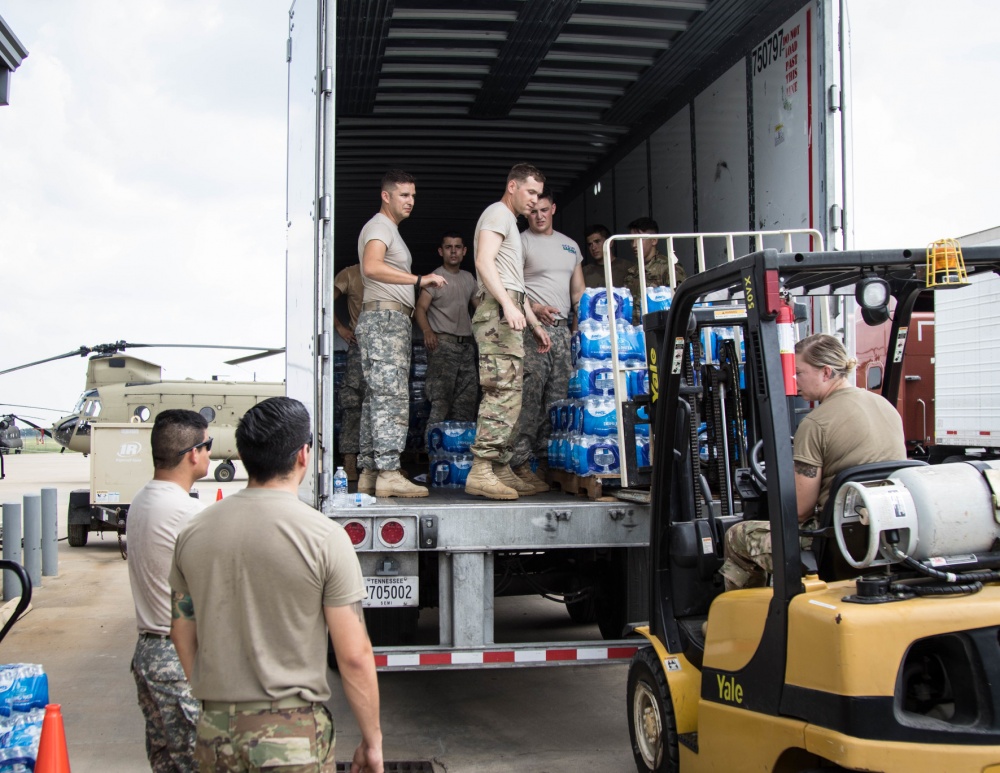 Photo By Sgt. Jazmin Jenkins | Soldiers from the 36th Combat Aviation Brigade unload pallets of water from a Federal Emergency Management Agency (FEMA) semi-truck at Houston Exective Airport in Katy, Texas to be distributed to Hurricane Harvey victims Sept. 3, 2017. The Department of Defense is conducting Defense Support of Civil Authorities operations in response to the effects of Hurricane Harvey. DSCA operations are part of the DOD's response capability to assist civilian responders in saving lives, relieving human suffering and mitigating property damage in response to a catastrophic disaster. (U.S. Army photo by: Sgt. Jazmin Jenkins / 22nd Mobile Public Affairs Detachment)
Photo By Sgt. Jazmin Jenkins | Soldiers from the 36th Combat Aviation Brigade unload pallets of water from a Federal Emergency Management Agency (FEMA) semi-truck at Houston Exective Airport in Katy, Texas to be distributed to Hurricane Harvey victims Sept. 3, 2017. The Department of Defense is conducting Defense Support of Civil Authorities operations in response to the effects of Hurricane Harvey. DSCA operations are part of the DOD's response capability to assist civilian responders in saving lives, relieving human suffering and mitigating property damage in response to a catastrophic disaster. (U.S. Army photo by: Sgt. Jazmin Jenkins / 22nd Mobile Public Affairs Detachment)
KATY, TX, UNITED STATES
09.03.2017
Story by Sgt. Jazmin Jenkins
22nd Mobile Public Affairs Detachment
KATY, Texas - Six forklifts manned by Texas Army National Guardsmen line up outside of a hangar at a small airport just outside of Houston awaiting the next semi-truck filled with supplies to offload. Although most of the forklift operators are not logisticians by trade, they are combining skills earned working for the military and in the civilian sector to accomplish the mission.
First Lieutenant Tim Dubose, an intelligence officer with 36th Combat Aviation Brigade, volunteered to manage a shipping and receiving site for distributing supplies based on his 10-years of civilian experience as a project manager.
The mission of Dubose’s Austin-based unit is to support Texas Army National Guard disaster recovery operations by getting Federal Emergency Management Agency (FEMA) supplies to distribution points using helicopters.
Dubose said that no mission within the specialty for which the military trained him existed for hurricane relief operations. However, the leadership skills taught to all Army officers, paired with his civilian credentials, made his selection for a leadership position at a logistics hub in the recovery efforts a natural one.
"I was selected to be in an (officer in charge) position,” said Dubose. “When I arrived at Houston Executive Airport, there was a need for logistical problem set."
He used the project management skills required in his civilian job experience to synergize a team of Soldiers sent from around the United States to efficiently deliver supplies at the FEMA distribution site established at the airport.
One of the people working for Dubose is Pfc. Matthew Riffe, a generator mechanic with 36th CAB, based out of Austin, Texas. Like Dubose, the 22-year old is using a combination of skills learned in the military and in his civilian job to ensure mission success. Riffe works in logistics shipping and receiving coordinator in his civilian occupation and has six years of forklift experience.
"I volunteered to man the forklift because they were short-handed and I have the experience and skillset to contribute to the mission," said Riffe.
FEMA brings life sustaining supplies to be distributed by the military to the Houston Executive Airport for Hurricane Harvey victims. Soldiers with 36th CAB off-load and inventory those supplies. Afterwards the supplies are palletized and organized to fit inside the dimensions of a CH-47 Chinook helicopter.
Dubose said one of the most important skills he’s using from his civilian job is proper communication between teammates and managing resources effectively. Additionally, his experience in acquisitions aligns with the mission at the distribution site.
"Flight operations identifies specific supplies to go on the necessary aircraft by customer demand," said Dubose. "We fill that order by loading the supplies in the aircraft, then make sure we track and inventory afterwards."
The FEMA distribution site at Houston Executive Airport is one of the major hubs re-supplying areas affected by Hurricane Harvey. The site has delivered an average of 25 tons of supplies per day since operations began on Aug. 31.
Thousands of people along the U.S. Gulf Coast were affected by Hurricane Harvey. The efforts to relieve those in need involves Soldiers and necessary skills to accomplish the mission.
“This is an important mission to be a part of,” said Dubose. “We have all come together and used all of our skills to get the job done."